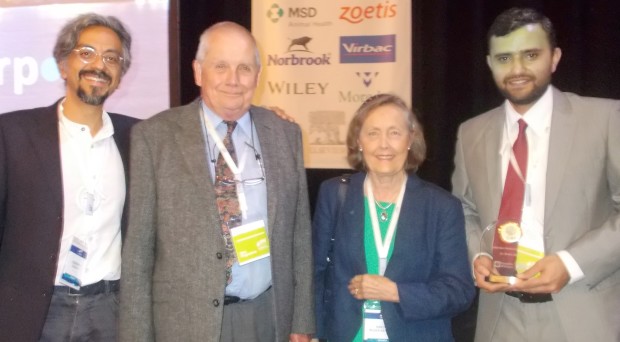
Abdul, congratulations on winning the Odile Bain Memorial Prize in 2015. How does it feel to have been awarded the prize?
Thank you, I feel extremely honoured and privileged to receive the 2015 Odile Bain Memorial Prize in veterinary parasitology. This prize really recognizes the outstanding work of Odile Bain as well as inspires and motivates young parasitologists to achieve excellence in the field.
I would like to thank the sponsors, Parasites & Vectors and Merial, for supporting this prize. This award is dedicated to my mother, mentors and family members for their continuous guidance and support. All praises be to the Almighty God.
You won the award for your contribution to veterinary parasitology so far. Could you tell us about your research career to date?
After graduating as a veterinarian from the University of Agriculture, Faisalabad, Pakistan in 2001, I started working on the epidemiology and chemotherapy of gastrointestinal nematodes of ruminants in Pakistan.
During my PhD at the University of Melbourne (2007-2010), I worked on host-parasite interactions and the localization of the host-protective antigens in parasitic cestodes of major socioeconomic importance, and identified the type of cells involved in the production of host-protective antigens.
Subsequently, as a postdoctoral fellow and an academic in the same University, I have been working on epidemiology, evolution, genetics, mitochondrial genomics and molecular diagnosis of parasites of economic significance.
To date, my research contribution in Veterinary Parasitology includes more than 90 publications, and since 2011, I have published 56 high quality peer-reviewed articles, including 17 as first author and 12 as senior author.
I have already attracted a number of competitive grants, and am consolidating a solid program in veterinary parasitology. I have supported a range of undergraduate and postgraduate research students as well as visiting scientists since 2011. My first PhD student completed their degree in August 2015 and published six high quality peer-reviewed research papers.
What factors have influenced your career? What made you move from veterinary medicine to focus on parasitology research in particular?
I have always been intrigued by the fascinating creatures that exist as parasites. They have complex life cycles and are able to thrive in harsh and hostile environments inside and outside their hosts.
I have always been intrigued by the fascinating creatures that exist as parasites. They have complex life cycles and are able to thrive in harsh and hostile environments inside and outside their hosts. I reckon that three main factors have influenced my career over the years, including hard work, family support and presumably right choices at the right times. In addition, I have been very fortunate to have dedicated, supporting colleagues and mentors throughout my research career.
And what are you currently working on?
Currently, I am working on epidemiology and control of economically important parasitic diseases of livestock. In addition, I work/collaborate on drug discovery, evolution, genetics, mitochondrial genomics and molecular diagnosis of parasites of economic significance.
Could you give us an idea of what it is like being a parasitologist in Australia? Which research areas are Australian parasitologists mainly working on? What are the particular challenges for Australian parasitologists?
The field of parasitology is really important in an agricultural country like Australia. As animals are reared on extensive grazing systems that expose them to a variety of parasites all the time and also resistance against major antiparasitic drugs is widespread.
Veterinary parasitologists have a key role in not only understanding the direct economic losses caused by these parasites, but also helping in controlling these parasites to increase the productivity of production animals.
The main challenge faced by the Australian veterinary parasitologists is the drug resistance in parasitic nematodes.
What do you see as the future trends in veterinary parasitology?
In my opinion, the future of veterinary parasitology is going to be really important. As the human population is growing rapidly and the supply of animal proteins is going to be crucial to meet the demand, we, as veterinary parasitologists, will have a key role in increasing the productivity of production animals by developing effective methods to control economically important animal parasites.
What advice would you give to early career scientists in general and, in particular, to those looking to pursue research in veterinary parasitology?
Identify an area of research to address an important problem in veterinary parasitology, focus and just work hard. Although there will be tough times in your career, you will get to your destination by perseverance, dedication and support of your family and friends.

Comments